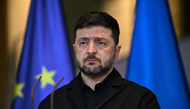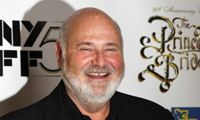▶ FRANK BRUNI
We could use a few pointers on prudence.
Do me a favor. Turn away from the ceaseless media coverage of Ebola in Texas - the interviews with the Dallas nurse’s neighbors, the hand-wringing over her pooch, the instructions on protective medical gear . and answer this: Have you had your flu shot? Are you planning on one?
During the 2013-2014 flu season, according to the Centers for Disease Control and Prevention, only 46 percent of Americans received vaccinations against influenza, even though it kills about 3,000 people in this country in a good year, nearly 50,000 in a bad one.
These are deaths by a familiar assassin. Many of them could have been prevented. So why aren’t we in a lather over that? Why fixate on remote threats that we feel we can’t control when there are immediate ones that we simply don’t bother to?
On matters exotic, we’re rapt. On matters quotidian, which are nonetheless matters of life and death, we’re cavalier. Tens of thousands of Americans die in car crashes annually, and according to a federal analysis from 2012, more than half of them weren’t wearing seatbelts.
Perhaps that didn’t make a difference in many cases. In some, it probably did. But on this front, as on others, we have clear answers about how to minimize risk and we simply proceed to forget or ignore them.
There’s no way to square skin-cancer statistics in the United States - more than 3.5 million cases diagnosed yearly and almost 10,000 deaths - with the number of Americans showing off their tans. They aren’t all getting body paint. They’ve been lectured about sunscreen and shade and hats. But vanity trumps sanity, and melanoma rides its coattails.
I’m not dismissing the horror of Ebola, a full-blown crisis in Africa that should command the whole world’s assistance. And Ebola in the United States certainly warrants concern. We’re still searching for definitive answers about transmission and prevention.
But Americans already have such answers about a host of other, greater perils to our health, and we’d be wiser to reacquaint ourselves with those, and recommit to heeding them, than to worry about our imminent exposure to Ebola.
“People get very fearful and stressed out and have a lot of anxiety about things like Ebola that aren’t a general health risk,” said Jeffrey Duchin, who is the chairman of the public health committee of the Infectious Diseases Society of America. “Just look at causes of death in the United States. Everything is higher than Ebola, and there are things that we can do about many of them.”
Duchin, a physician, moderated a panel of experts who discussed Ebola at the society’s conference last week. These doctors sought to refocus attention on influenza, which lacks novelty but not potency.
In my conversation with him, Duchin also pointed out that between 2.7 and 5.2 million Americans are believed to be infected with the hepatitis C virus. Deaths related to it can range widely, from 17,000 to 80,000 annually, he said. There’s a test for it. There’s effective treatment. But the C.D.C. says that up to 75 percent of the people with the virus don’t know they have it.
Stephen Morse, a professor of epidemiology at Columbia University’s Mailman School of Public Health, told me: “We have a lot of vaccine-preventable diseases and we see more and more people refusing to have their children take vaccines.”
He was referring to outbreaks of measles and pertussis (or whooping cough) in states and cities where parents have hallucinated a connection between immunizations and autism. They cling to this fiction in the face of scientific information to the contrary.
Both The Hollywood Reporter and Time magazine recently published accounts of anti-vaccine madness among supposedly educated, affluent Americans in particular. According to the story in The Hollywood Reporter, by Gary Baum, the parents of 57 percent of the children at a Beverly Hills preschool and of 68 percent at one in Santa Monica had filed personal-belief exemptions from having their kids vaccinated.
Such numbers, Baum wrote, “are in line with immunization rates in developing countries like Chad and South Sudan.”
On CNN on Monday night, a Dallas pediatrician was asked about what she had advised the families she sees. She said that she urged them to have their children “vaccinated against diseases that we can prevent,” and that she also stressed frequent hand-washing. Ebola or no Ebola, it’s a responsible . and frequently disregarded - way to lessen health risks.
So are these: fewer potato chips. Less sugary soda. Safer sex- Tighter restrictions on firearms. More than 30,000 Americans die from gunshots every year. Anyone looking for an epidemic to freak out about can find one right there.
스마터리빙
more [ 건강]
[ 건강]이제 혈관 건강도 챙기자!
[현대해운]우리 눈에 보이지 않기 때문에 혈관 건강을 챙기는 것은 결코 쉽지 않은데요. 여러분은 혈관 건강을 유지하기 위해 어떤 노력을 하시나요?
 [ 건강]
[ 건강]내 몸이 건강해지는 과일궁합
 [ 라이프]
[ 라이프]벌레야 물럿거라! 천연 해충제 만들기
 [ 건강]
[ 건강]혈압 낮추는데 좋은 식품
[현대해운]혈관 건강은 주로 노화가 진행되면서 지켜야 할 문제라고 인식되어 왔습니다. 최근 생활 패턴과 식생활의 변화로 혈관의 노화 진행이 빨라지고
사람·사람들
more많이 본 기사
- 트럼프, MAGA 내부서도 식나… ‘매우 지지’ 8개월새 8%p 하락
- 이종호측 “김건희에 3억 수표 전달”…법정서 돌발 주장
- 취임 1년 앞두고 기세 꺾인 트럼프
- 유럽, 우크라 안전보장 다국적군 제안…유럽 주도하고 미국 지원
- “과부랑은 결혼해도 이혼녀는 절대 안 돼”…뿌리 깊게 박힌 편견, 中 차별 역사 보니
- ‘美정부가 대주주’ 인텔, 대관담당으로 트럼프 보좌관 영입
- 尹 ‘체포방해 혐의’ 내달 16일 선고…4개 재판 중 첫 결론
- 젤렌스키 “푸틴이 종전안 거부하면 미국에 장거리 무기 요청”
- 트럼프, ‘의회폭동 다큐’ BBC에 100억 달러 명예훼손 손배소
- 테슬라 주가 올들어 최고…사상 최고치도 연내 경신하나
- 경찰, 김건희특검 상대 추가 압수수색…내일 한학자 접견조사
- ‘10명 탑승’ 항공기 멕시코서 추락… “최소 6명 사망”
- LA서 ‘새해벽두 폭탄테러’ 모의 일당 체포… “기업들 공격 시도”
- 마약딛고 함께 영화도 만들었는데…라이너감독 살해한 아들 체포
- 우크라인 75% “확고한 안전보장 없이 러 유리 종전안 수용 불가”
- 미국, 무역합의 이행 늦다며 최우방 영국에 AI협력 일시중단
- 관세가 끌어올린 물가… 가구당 1,200달러 추가 지출
- 대기천 워싱턴주 강타 역대급 홍수 ...워싱턴주 서부 이례적인 대기천 폭우로 역대급 홍수 발생
- “197명 아빠 된 정자 기증자, ‘암 위험 90%’ 돌연변이 보유자였다”…10명 이미 암 진단
- ‘핀테크 원조’ 페이팔, 미국서 은행 설립 나서
- 항공기 승객정보 활용 추방 확대
- [경제 트렌드] 외식비 줄이는 소비자… ‘팁 공포’ 한몫
- 뉴욕 백화점서 아기 기저귀 갈던 엄마, 정신질환자에 흉기피습
- 오레곤문인협회 신임 회장에 김인자 시인...11일 정기총회서…김혜자 직전회장 6년간 헌신 다해
- 국과수 “김수현·故 김새론 녹취파일, AI 조작 판정 불가”
- ‘15년째 활동 無’ 원빈 근황, 이시언 유튜브서 공개..”잘 지내는 중”
- [송년행사 화보] “웃음과 감사 가득 ‘훈훈’… 함께해서 행복”
- 대장동 ‘범죄수익 찾기’ 본격화…김만배·남욱, 추징해제 청구
- 조미김, 미국 수출관세 ‘면제’됐다…K-김 최대시장서 날개
- 박나래 ‘링거·주사 이모’ 난리통 속 결국..MBC ‘팜유트립’ 제작 무산
- ‘해리가 샐리를 만났을 때’ 롭 라이너 감독 부부 피살
- 백화점서 아기 기저귀 갈던 엄마 40대 정신질환자에 흉기 피습
- 테슬라 11월 미국 판매… 4년만에 최저
- 지구촌 또 ‘총기 난사’… 미·호주 잇단 참사
- 19개주, 전문직 비자 ‘10만불 수수료’ 소송
- ‘최고 부자’ 머스크 자산 6천770억달러 돌파…”최초 조만장자 눈앞”
- 브라운대 총격사건 수사 난항 겪나…체포한 용의자 석방
- 내란특검, 김용현 추가 기소… “HID요원 등 명단 노상원에 넘겨”
- ‘128개 홈디포 매장서 319건 절도’ 플러싱 기반 전문절도단 일망타진
- ‘아연’의 효과… 올바르게 복용하면 감기 기간 줄일 수도
- 퇴조의 핑크 타이드
- [조지 F. 윌 칼럼] 대통령의 전쟁수행권
- 트럼프, 라이너감독 피살에 “나에 대한 발작적 집착이 분노유발”
- “내 한국인 남편, 40일 넘게 개처… 1
- 오늘의 베네수엘라가 내일의 동아시아국… 2
- 트럼프 관세 인하에도… 주요 식품 줄줄이 급등
- 한국 3월 A매치 상대 한 팀 사실상 확정... 오스트리아 감독 ‘평가전 인정’
- 뉴욕증시, AI 회피 심리 지속…하락 마감
- ‘베네수 코앞’ 트리니다드토바고 “미군에 공항접근 허용”
- 연은 총재 전원 재임명 연준, 만장일치 표결
1/5지식톡

-
 ☝️해외에서도 가능한 한국어 선생님…
0
☝️해외에서도 가능한 한국어 선생님…
0이 영상 하나면 충분합니다!♥️상담신청문의♥️☝️ 문의 폭주로 '선착순 상담'만 진행합니다.☎️ : 02-6213-9094✨카카오톡ID : @GOODEDU77 (@골뱅이 꼭 붙여주셔야합니다…
-
 테슬라 자동차 시트커버 장착
0
테슬라 자동차 시트커버 장착
0테슬라 시트커버, 사놓고 아직 못 씌우셨죠?장착이 생각보다 쉽지 않습니다.20년 경력 전문가에게 맡기세요 — 깔끔하고 딱 맞게 장착해드립니다!장착비용:앞좌석: $40뒷좌석: $60앞·뒷좌석 …
-
 식당용 부탄가스
0
식당용 부탄가스
0식당용 부탄가스 홀세일 합니다 로스앤젤레스 다운타운 픽업 가능 안녕 하세요?강아지 & 고양이 모든 애완동물 / 반려동물 식품 & 모든 애완동물/반려동물 관련 제품들 전문적으로 홀세일/취급하는 회사 입니다 100% …
-
 ACSL 국제 컴퓨터 과학 대회, …
0
ACSL 국제 컴퓨터 과학 대회, …
0웹사이트 : www.eduspot.co.kr 카카오톡 상담하기 : https://pf.kakao.com/_BEQWxb블로그 : https://blog.naver.com/eduspotmain안녕하세요, 에듀스팟입니다…
-
 바디프렌드 안마의자 창고 리퍼브 세…
0
바디프렌드 안마의자 창고 리퍼브 세…
0거의 새제품급 리퍼브 안마의자 대방출 한다고 합니다!8월 23일(토)…24일(일) 단 이틀!특가 판매가Famille: $500 ~ $1,000Falcon: $1,500 ~ $2,500픽업 & 배송직접 픽업 가능LA…
케이타운 1번가
오피니언
 옥세철 논설위원
옥세철 논설위원오늘의 베네수엘라가 내일의 동아시아국가…

퇴조의 핑크 타이드
 조지 F·윌 워싱턴포스트 칼럼니스트
조지 F·윌 워싱턴포스트 칼럼니스트 [조지 F. 윌 칼럼] 대통령의 전쟁수행권
 조옥규 수필가
조옥규 수필가 투고(To Go) 해야 하나?
 신경립 / 서울경제
신경립 / 서울경제 [만화경] ‘뒷마당’ 찾겠다는 트럼프식 먼로주의

22기 LA평통 출범에 거는 기대

연말 시즌 사기·범죄 경계해야
 메건 매카들 워싱턴포스트 칼럼니스트
메건 매카들 워싱턴포스트 칼럼니스트 [메건 매카들 칼럼] 장편영화의 마지막 챕터인가
 김미선 서북미문인협회 회장시인
김미선 서북미문인협회 회장시인 [한국춘추] 하늘을 계산한 사람들, 칠정산
1/3지사별 뉴스

피로 얼룩진 주말…지구촌 곳곳 총격사건 잇달아
지난 주말 동안 미동부 아이비리그 브라운대학에서 총격 사건이 발생, 최소 2명이 사망하고 9명이 부상한데 이어 호주 시드니에서는 사망자 16…
뉴욕·뉴저지 등 19개 주정부 H-1B비자‘10만달러 수수료’소송

워싱턴 한국학교협의회, 제37회 교사의 밤
재미한국학교 워싱턴지역협의회(회장 정광미)가 13일 ‘제 37회 교사의 밤’을 개최, 한 해 동안 헌신한 교사들의 노고를 위로했다. 올해 최우…
안수화 회장 연임 확정

트럼프, 합성마약 펜타닐을 ‘대량살상무기’로 지정
도널드 트럼프 대통령은 15일 신종 합성마약으로 미국에 대량 유입된 펜타닐을 ‘대량살상무기’(WMD)로 지정했다.트럼프 대통령은 이날 백악관에…
‘우미노시즈쿠 후코이단’ 감사 이벤트

오늘 하루 이 창 열지 않음 닫기 





















































.png)


댓글 안에 당신의 성숙함도 담아 주세요.
'오늘의 한마디'는 기사에 대하여 자신의 생각을 말하고 남의 생각을 들으며 서로 다양한 의견을 나누는 공간입니다. 그러나 간혹 불건전한 내용을 올리시는 분들이 계셔서 건전한 인터넷문화 정착을 위해 아래와 같은 운영원칙을 적용합니다.
자체 모니터링을 통해 아래에 해당하는 내용이 포함된 댓글이 발견되면 예고없이 삭제 조치를 하겠습니다.
불건전한 댓글을 올리거나, 이름에 비속어 및 상대방의 불쾌감을 주는 단어를 사용, 유명인 또는 특정 일반인을 사칭하는 경우 이용에 대한 차단 제재를 받을 수 있습니다. 차단될 경우, 일주일간 댓글을 달수 없게 됩니다.
명예훼손, 개인정보 유출, 욕설 등 법률에 위반되는 댓글은 관계 법령에 의거 민형사상 처벌을 받을 수 있으니 이용에 주의를 부탁드립니다.
Close
x